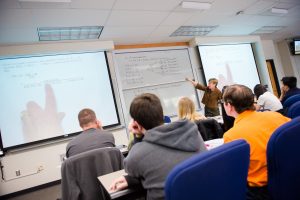 Bruce Seely, Dean of the College of Sciences and Arts, has chosen to recognize Beth Reed, senior lecturer and assistant to the chair in mathematical sciences as our first Spring 2017 Dean’s Teaching Showcase member.
Bruce Seely, Dean of the College of Sciences and Arts, has chosen to recognize Beth Reed, senior lecturer and assistant to the chair in mathematical sciences as our first Spring 2017 Dean’s Teaching Showcase member.
Seely’s nomination was influenced by Brent Baltus, a senior on the hockey team, who singled Reed at the Faculty Appreciation event during a game on December 2nd.
Baltus, a senior major in Finance who started this year with a 3.73 GPA, named Reed as “the best professor he had encountered” at Michigan Tech. Baltus had taken a couple of classes from her during his first two years in statistics and math and added she was “an unbelievable professor.”
Seely asked Reed what she does that would lead a good student (and athlete) like Brent to value her efforts. She answered with several points from the recently submitted students teaching evaluations for Fall 2016 and offered several points. Reed knows every student’s name, signaling that they are individuals to her. This makes her approachable and shows she cares about them as people. She prepares a handout for every class session containing the concepts, problems, formulas and so on covered that day. This allows students to actually listen in class rather than struggling to write everything down. Her handout adds structure to the notes taken by the students while eliminating transcription errors. Reed dedicates some class periods to worksheet days, devoted to working problems while she walks around and answers questions from students.
Finally, she asks a lot of questions of the students during class sessions. Students report this makes them pay attention (especially at 8 a.m.). When a student offers an incorrect answer, she talks them through the process until they get to the correct answer. Seely also asked Reed if there was something she did that specifically helps student athletes, who must miss classes due to travel.
In addition to her willingness to meet with them outside of class, she noted the most important thing was to ask them to introduce themselves on the first day of class. That allows her to work with them and their schedules. From this initial discussion, it is much easier to ensure Reed has a heads-up when an assignment and/or exam might conflict with games and travel. Such communication allows her and the student to work around any conflicts.
These are the kinds of effort — small steps in some respects, but large in the aggregate — that make a difference in how well students do. While a student-athlete recognized Reed’s efforts, the more important fact is that she makes these attempts for any student.
Reed will be recognized at an end-of-term luncheon with 11 other showcase members, and is now eligible for one of three new teaching awards to be given by the William G. Jackson Center for Teaching and Learning this summer recognizing introductory or large class teaching, innovative teaching methods or work in curriculum and assessment.